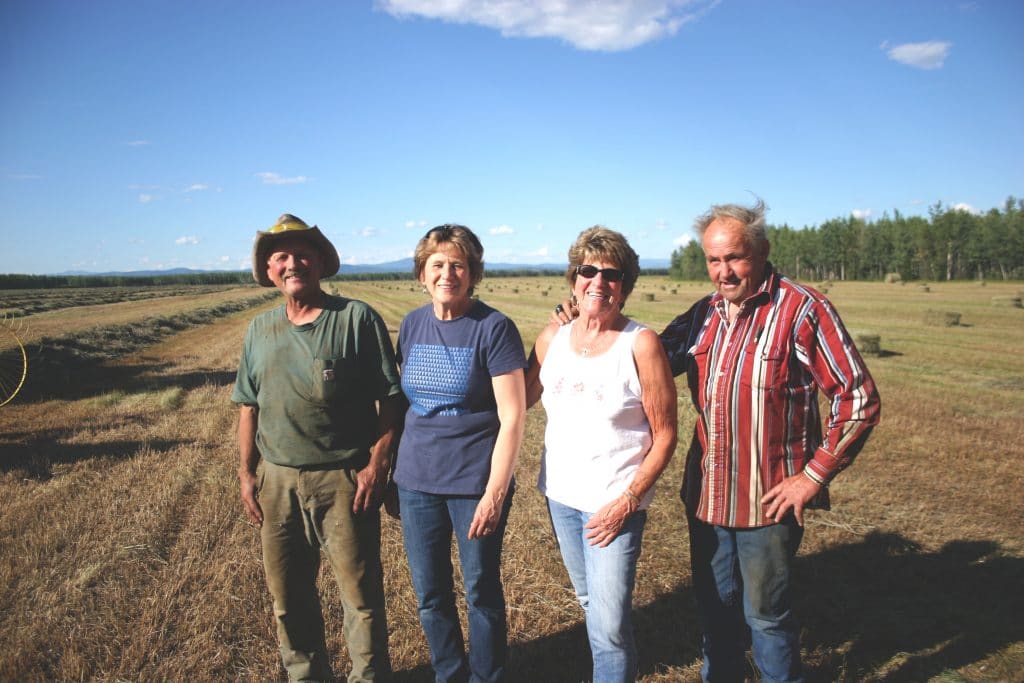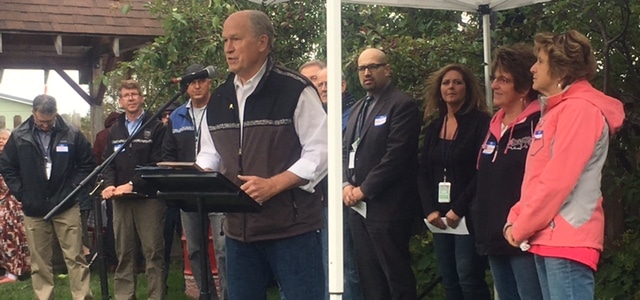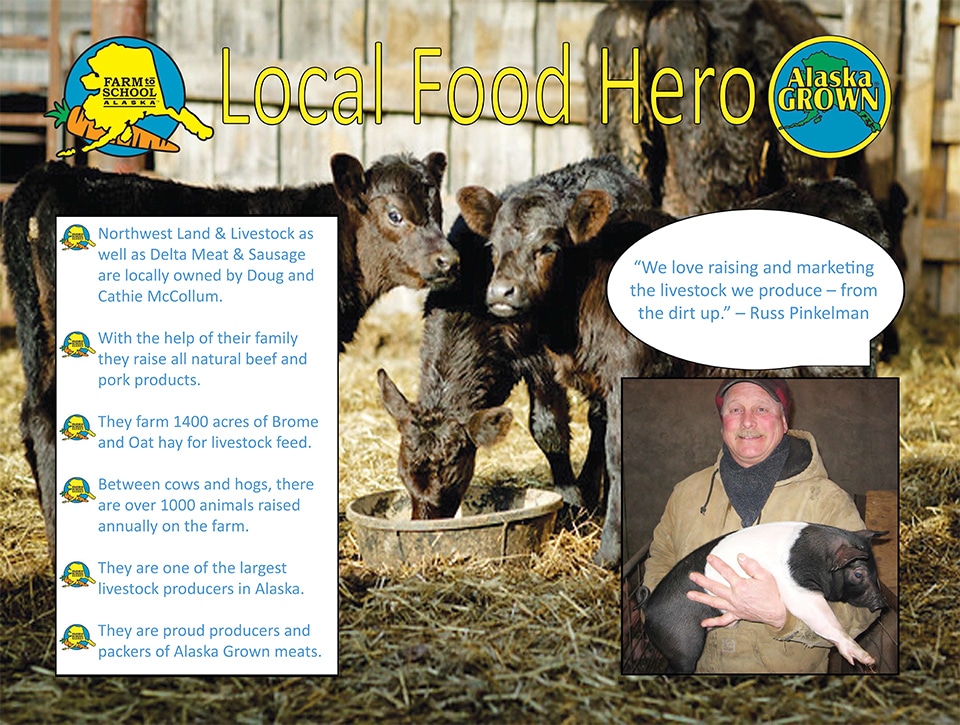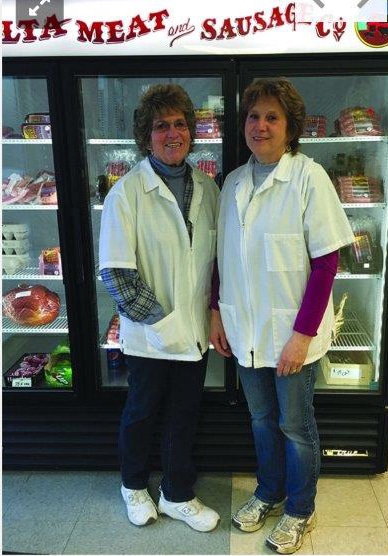~ A Bit of History ~
As pioneers in Alaska’s meat industry, Delta Meat and Sausage is a family-owned business, built by owners Doug and Cathie McCollum back in 1997. It became incorporated in 2007 and is managed by Cathie and their daughter Jeannie Pinkelman.
The building site is 9 miles east of Delta Junction on land that was purchased by John Deere, a farm implement dealer back in the 1980’s. It was during that time the State of Alaska sold large tracks of land in hopes of developing agriculture in Delta Junction. The John Deere dealership moved in to support the farmers. It soon became evident that the prices paid for agricultural land, short growing season, lack of markets and infrastructure put the agricultural project from the beginning in peril. Soon the dealerships moved on and the building was left idle for years.
McCollum’s came to Alaska back in 1968 from Montana. Doug was raised on a farm around Utica near Great Falls. He had dreamed of Alaska as a youth and always wanted to see the country. He knew of another fellow from Montana named Al Remington that was homesteading in a place called Delta Junction, and that gave him the opportunity to strike out and see the country for the first time in 1967. He soon returned with his family to make Delta Junction their home. Shortly after arriving they purchased a 320 acre parcel of land out in the Clearwater from the State of Alaska.
Having seen so many opportunities he and partner at the time, Al Wilson purchased Remington’s old concrete batch plant. Thus, began a 35 year adventure of owning Delta Concrete. Delta Concrete was sold in 2004 when the local economy boomed due to the development of a missile defense base located at nearby Ft. Greely. Once having that business established he sought out his desire to raise cattle again in 1984.
Doug’s love for agriculture never waned, knowing the environment of Alaska and the harsh winters. He did his research on a hearty breed that could take the cold winters, and have a quality carcass, and came across the Galloway Cattle breed, a breed originating from the hills of Scotland. The Galloway’s coat of hair is similar to that of the buffalo, a short undercoat and a long overcoat. They are a medium sized animal and really standout in their crossbreeding. The University of Alaska in the early years researched the Galloway breed.
In 1984 Doug and Cathie went down to the Paulson’s Ranch in North Dakota and purchased 17 heifers and a Galloway Bull. Today they raise between 400 and 500 head of Galloway/Angus cattle from birth to market.
The Galloway meat is naturally lean and tender sweet, a taste that McCollum had missed from the meats purchased from the grocery store. McCollum’s beef are raised in a stress free environment without growth hormones and fed a nutritionally rich diet of brome hay with a small amount of ground barley. They are ready for market in 20 to 22 months. Alaskan soils are deficient in minerals. Fertilizers are used to enhance the quality of forage for the livestock and selenium salt is given as a free choice mineral supplement. Vaccinations are not necessary due to the remoteness of the herd.
The first few years of raising cattle were used as a trial to see if this was going to be feasible before jumping in full scale. Knowing that the John Deere building had been sitting vacant for years it was a perfect site for the packing plant. In 1995 they purchased the John Deere building and started the remodel and application to become a State Certified packing plant.
McCollum’s Son-in-law Russ Pinkelman with his building experience fully remodeled the plant to State standards. With another partner in tow the doors opened for business in 1997. By summer of 1998 the partner moved on and McCollum had two businesses to take care of.
Daughter Jeannie stepped in to manage the plant with a small crew and the help of husband Russ, Doug and Cathie, Delta Meat continued the steady growth of building a new business. In 1999 the plant took another blow from the State of Alaska during the last week of the legislature when DEC cut their red meat inspection program from the budget. As a result we became a Federal USDA Plant #20892.
Hogs were added to the farm in the summer of 2000. We market fresh sides of pork with smoked hams and bacon, hogs for barbecue’s, and wiener pigs.
Today Delta Meat has evolved into a full service slaughter and meat processing facility. Cathie and Jeannie still run the plant. Doug and Russ take care of the farm and livestock. We market locally raised All Natural beef, pork, buffalo, yak, elk and reindeer from the local farmers. We are a hub for the big game hunters to come for their specialty game processing and have a custom smoke house specializing in delicious sausages, hams and bacon.
2017 Farm Family of the Year


The McCollum Pinkelman family of Delta Junction were selected by the agricultural committee as the 2017 Alaska State Fair Farm Family of the Year! It was a special honor to be recognized by Governor Bill Walker, with a reception hosted by the agricultural committee at the State Fair Grounds in Palmer, Alaska.
“Doug and Cathie McCollum and their daughter and son-in-law Jeannie and Russ Pinkelman operate both their farm, Northwest Land & Livestock, and their processing plant, Delta Meat & Sausage, Inc. The farm began in 1984, when Doug and Cathie purchased 17 heifers and a Galloway Bull from a farm in South Dakota. Today they raise between 400 and 500 head of Galloway/Angus cattle and 350 pigs. Delta Meat & Sausage, Inc. was established in 1997, and is a full-service slaughter and meat processing facility. They market beef, pork, buffalo, yak, elk and reindeer from local farmer, and process specialty game from local big game hunters.
The McCollums have lived in Alaska for 49 years, and currently three generations of the family work on their farm in Delta Junction. Doug and Russ work on the farm, with Doug doing the mechanical maintenance and Russ managing the livestock and building. Cathie and Jeannie run the plant, and Doug and Cathie’s grandchildren Quinn and Lincoln help with chores on the farm. They also hire part-time help. Their future farming plans are to continue business as usual, and to maintain the quality that the local communities have been getting from them for years.

